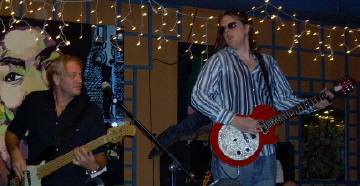
Normally
the “Lucky Seven” process is simple… an exchange of e-mails where
a person (or people) are invited to answer some questions.
Not
this time.
Joe
Bonamassa is an incredibly gifted guitarist and performer. In
early February, I was able to contact him through his representatives
at Premier Artists Services. Thanks to the help (and patience)
of Premier Artists I made arrangements to have Joe participate
in a “Lucky Seven” effort that was set to be expanded a bit. Joe
happens to be a major influence for my stepson, Justin. I wanted
to explore a kind of “meeting my influences” type of theme, and
Joe kindly agreed to answer questions from both Justin and I.
The
trick is… when your schedule includes traveling in Europe in February,
something between fifteen and twenty different states in March
(ranging from Nevada and Texas to New York and Rhode Island),
and then back to Europe in April… well… you don’t have much time
to read your e-mails, let alone put up with my rambling questions.
So what did Joe do? He offered to meet with us in person prior
to his March 17, 2006 show at Chan’s in Woonsocket, Rhode Island.
Two
interesting things about this interview. Number one, I was introduced
to Joe and his work by my stepson, Justin. Last year he attended
a B.B. King concert with a friend (Gabe), and Joe was one of the
performers. The two boys couldn’t stop talking about him. Even
without a true publication backing me (this has been done for
my web site and possible future consideration), Joe and Premier
were amazingly gracious in setting up this interview not just
for me, but to include Justin and Gabe so we could explore the
influences concept. Number two, Joe made time for us right in
the middle of a schedule that included five shows over four nights
in four states. He had already performed in Pennsylvania and Connecticut,
was slated to perform in New York on Saturday, and he still made
time for us on the night of his two-show appearance.
If
I am so fortunate as to bring you thousands of interviews over
a career of writing, I don’t think there is any way a group of
people will ever be friendlier or more accommodating than Joe
and his group were in setting up and conducting this interview.
During the interview, Joe mentioned that he is working on “building
fans, one at a time.” I don’t know how many more fans he gained
in the room… but on this night he wound up solidifying the appreciation
two teenagers have for his skills and ability, and impressing
four new, dedicated fans that can attest to the excitement of
his live performances (our overall group at the show was six people).
Joe was personable, easy to talk to, and both of the boys are
still talking about how great it was to spend some time with him.
In short, he’s the kind of guy you’re not only thrilled to see
succeed, but wish every success to in the future as well. In addition
to this article, I plan on bringing you a general one soon, as
well as a review of the show we saw.
But
enough of my babbling, let’s introduce you to Joe…
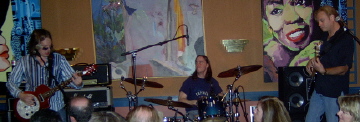
~ ~
~ ~ ~
Joe
Bonamassa began his amateur guitar playing at the age of four.
His father, a dealer of vintage guitars, started Joe playing on
a Chiquita guitar (scaled-down model). By the age of seven he
was playing on a full-scale model.
He
credits his first vintage purchase to a 1954 Fender Stratocaster.
He currently owns over 150 guitars, and although some are incredibly
rare and valuable, he feels that “they should be played as the
truest way to honor them.” Whether at home, while recording, or
as part of his live performances, every one of his guitars gets
played. (And judging from the message boards, there is an excitement
that builds when certain models… like his gold Fender… join him
on stage. Personally, I am fascinated with the Gigliotti.)
He
was asked to perform with B.B. King at the age of twelve. What
does B.B. think of him? Check this out: “This kid’s potential
is so great that he hasn’t begun to scratch the surface. He’s
one of a kind… a legend before his time.” Those words create some
awfully big shoes to fill… and yet after seventeen years of appearing
with B.B. King, he has yet to reach his thirtieth birthday.
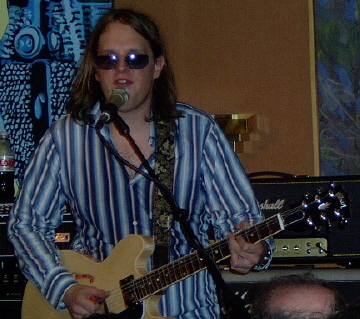
Joe
was fairly well-regarded in the industry from an early age, but
his commercial breakout occurred when he teamed up with Berry
Oakley, Jr., Waylon Krieger, Erin Davis and Lou Segreti to form
Bloodline. Although the band eventually broke up, the group had
two hit singles, and the effort overall led Joe to the realization
that if he wanted to chart his own path doing the music he wanted
to create, he was going to need to sing. Bear in mind… the Bloodline
years began when Joe was still a teenager.
A
seasoned veteran… and just into his twenties… A New Day Yesterday
was his first solo release. He has followed it with So, It’s
like that, Blues Deluxe and Had to Cry Today.
Live performances have been captured on A New Day Yesterday
Live and the February 2006 release Live at Rockpalast.
In June 2006 he will release his next studio album.
~ ~
~ ~ ~
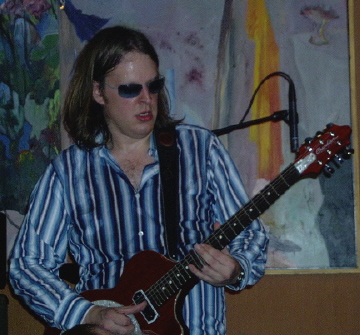
Bob:
You’re in the middle of one of the most demanding and unique tour
schedules I think I’ve ever seen. England in February, twenty-one
cities scheduled for March, and then back to Europe in April.
What are you doing?
Building
fans, one at a time. Every time we go back, there are a few more
people at the show, or maybe it sells out a bit sooner. One guy
tells another and brings him or her along.
Bob:
What are some of your favorite places to play?
They’re
all different, and all pretty special. We were at Toad’s last
night and that was smokin’.
Justin:
Do you ever have time to listen to other players?
Yeah.
I have an iPod and I listen to that a lot.
Gabe:
What do you look for in a bass player?
Someone
that can play in a power trio… they have to be conscious of the
melody, the tone, and the feel. Mainly they need to know when
to play and when not to.
Justin:
Do you like the drummer to have a good relationship with the bassist?
No
weak links in a trio. They’d show. (Bogie Bowles, the drummer
in the band, was eating at the next table. After answering this
question, Joe raised his voice slightly: “Right Bogieman?” After
a pause in which Bogie turned to us, Joe added “he’s not paying
attention” and laughed. “Did I miss my cue?” Bogie asked.)
Bob:
I want to mention Robben Ford for a few ideas that relate to your
musical growth and influences. First, I have heard that Robben
started out playing the saxophone. It was three years or so before
he switched over to guitar. As far as I know, you’ve been playing
the guitar since you started… have you ever been tempted by another
instrument?
Always
the guitar.
Bob:
Do you have any special influences?
Eric
Clapton… Jeff Beck… no real surprises there. English blues is
big. I just saw the new Queen and Paul Rodgers DVD and they were
awesome. Check that out if you can. It’s beyond good… as good
as it gets. Rodgers and Free, of course, would be on the list.
Robert Johnson and Rory Gallagher.
Bob:
I find Robben to be an incredible hidden treasure. When you ask
someone that plays guitar (professionally or even an amateur guitar
player), most of the regular names will be mentioned in some fashion,
and so is the name Robben Ford. And yet a lot of people that don’t
play aren’t that familiar with his name. I know you cite him as
a strong influence of yours. Who are some the people that you
listen to that others may not know about… but should?
Eric
Johnson… Larry Carlton… Sonny Landreth for his slide work.
Justin:
I wanted to know about that. Who influenced your slide playing?
Landreth
and Ry Cooder. I really like that Delta feel.
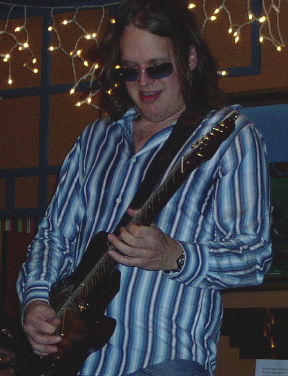
Bob:
Do you play every day, and for how long? Do you have any routines
for your practice sessions?
I’d
like to say yes… but no. This week we’re playing five shows in
four days. Next week we play five shows in three days. Basically
the off days right now are just to recover and rest.
Justin:
Do you alter your set list much when you play two shows in a night?
Not
really. The show is the show. Our set runs about ninety-five minutes,
and that’s enough. From there to about two hours is enough.
Bob:
Did you ever have any formal training?
I
took lessons in classical music when I was younger from a guy,
Mike, who taught at Julliard.
Justin:
What are some good music schools to look at?
I
really like Berklee. There’s something about that place that I
can’t really explain, but people come out of there different.
I’ve done a few clinics there. Ithaca is a good school, so is
Cornell and the Eastman School in Rochester. There are a few of
them.
Justin:
Do you like doing clinics?
Yeah.
One of the fun things is showing people that it isn’t just the
gear. People will say things like “look at the equipment you get
to use” as if that’s what it’s all about. So we’ll set up the
full rig and say “ok, here’s the gear, show us.” Music is internal
as much as external. It’s the phrasing and the tone… a complete
package.
Bob:
What advice would you give to younger players?
Be
yourself. People can see when you aren’t being honest. You have
to have heart and conviction in your playing. Everybody has the
opportunity to pick up a guitar.
Justin:
Like ninety percent of people don’t get to do what they like for
a living.
Exactly.
Bob:
How about your Blues in the Schools program? Do you have time
for that with all of this touring?
I
try to. We go any where that makes sense, and if there are a couple
of days off in a row we’ll usually play at two or three places.
Bob:
You’ve been quoted as saying that players today seem to be getting
weaker. Is the program part of helping with that?
Sort
of. I just don’t think many players today are that creative. They
don’t take as many chances or play what they really feel. They’re
trying too hard to play what they think they’re supposed to play.
Justin:
Do you think styles like blues and jazz are getting lost?
Absolutely.
The new playing is getting a bit stale. Nobody is doing anything
different, and the end result is that these forms of music aren’t
that inspiring to young kids.
Gabe:
Are you trying to do new things with the blues?
(Laughs)
Someone called it “bluesion” once, (raises his eyebrows and shakes
his head), which I thought was interesting. The bottom line remains
the same.
Justin:
Are you saying the blues is the bottom line?
Basically.
The big thing is that you have a blank canvas. And what you do
with that canvas is fresh each time. But yeah, there’s a foundation,
a bottom line. I’m not going to get up on stage for one of my
shows and launch into Oklahoma or another show tune. Not that
there isn’t a place for that.
Justin:
So music and art are similar that way?
Exactly.
Bob:
Do you model your playing to any specific influence or style?
And… some people find it difficult to work with a trio, but you
have done that for years. Is there any special make up of a group
that you prefer?
I
think I’ll always be in a trio. My influences are all over the
place though. Different songs… different moments.
Bob:
When did you decide that you wanted to play professionally? And
was there a moment when you knew it would work?
I
played my first gig at eleven. Some friends of mine and I just
formed a band and it took off from there.
Gabe:
How?
This
led to that and we ended up playing with some big names. I’ve
been fortunate enough that I’ve performed with B.B. King for seventeen
straight years. That’s always a special thing.
Bob:
What are some other special moments from your career?
Well…
any night you can perform with B.B. is a good one. Paul Rodgers
and John Popper were great.
Gabe:
Are there any special guitars that you like?
Justin:
Yeah… I’m looking for a new electric and was wondering about that
too.
You
know, it’s really a personal thing. I couldn’t recommend just
one. I have one-hundred and fifty-seven or fifty-eight guitars
and I play them all. I’ve seen $50,000 guitars that sounded like
crap and $500 guitars that were just awesome. Play it. You’ll
know. (Joe got up and came back with his calendar, which features
pictures of several of his vintage guitars.) You can check this
out.
Justin
(looking at the calendar): Is it weird seeing pictures of yourself?
Yeah…
I think I look fat. (Laughs)
Bob:
What equipment do you use that you swear by.
Boss
DD3 Delay. After that my set-up right now includes Marshall Amps…
Silver Jubilee. Buddhas. Two-Rock. And Fuchs.
Bob:
How about the new album? What were you looking for with it?
A
million-seller. (Laughs) It hits the street on June 6th. It has
some different stuff on it… some strings. I worked with Kevin
Shirley and Jason Bonham on it.
Justin:
Didn’t you work with a young harmonica player on the new record?
Yup.
Twelve-years old. Best I’ve ever heard.
Bob:
And right now you’re touring with Mark Epstein and Bogie (Bowles)?
Yeah.
Always touring.
Justin:
Will you be performing throughout the year? Any plans to unite
with B.B. King again for a show?
I
love performing with B.B. For one thing the show is a bit easier
because we play a forty-minute set. I’m sure we’ll get together
with him at some point. For the most part though, we’re headlining
now.
Bob:
Any major things on a personal “must do” list for the future?
Lose
some weight.
~ ~
~ ~ ~
A
very, very special thank you to Joe Bonamassa and Premier Artists
Services for all of their help and efforts in this “Lucky Seven”
offering.
To visit Joe’s web
site, use this link...
Joe
Bonamassa